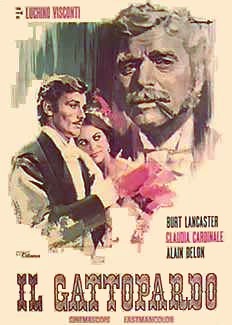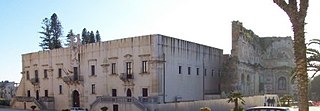Related Research Articles

Luchino Visconti di Modrone, Count of Lonate Pozzolo was an Italian filmmaker, theatre and opera director, and screenwriter. He was one of the fathers of cinematic neorealism, but later moved towards luxurious, sweeping epics dealing with themes of beauty, decadence, death, and European history, especially the decay of the nobility and the bourgeoisie. Critic Jonathan Jones wrote that “no one did as much to shape Italian cinema as Luchino Visconti.”

Giuseppe Tomasi, 11th Prince of Lampedusa, 12th Duke of Palma, GE, known as Giuseppe Tomasi di Lampedusa, was a Sicilian writer, nobleman, and Prince of Lampedusa. He is most famous for his only novel, Il Gattopardo, which is set in his native Sicily during the Risorgimento. A taciturn, solitary, shy, and somewhat misanthropic aristocrat, he opened up only with a few close friends, and spent a great deal of his time reading and meditating. He said of himself as a child, "I was a boy who liked solitude, who preferred the company of things to that of people", and in 1954 wrote, "Of my sixteen hours of daily wakefulness, at least ten are spent in solitude."

Giorgio Bassani was an Italian novelist, poet, essayist, editor, and international intellectual.
Salina may refer to:

The Leopard is a novel by Italian writer Giuseppe Tomasi di Lampedusa, which chronicles the changes in Sicilian life and society during the Risorgimento. Published posthumously in 1958 by Feltrinelli, after two rejections by the leading Italian publishing houses Mondadori and Einaudi, it became the top-selling novel in Italian history and is considered one of the most important novels in modern Italian literature. In 1959, it won Italy's highest award for fiction, the Strega Prize. In 2012, The Guardian named it as one of "the 10 best historical novels". The novel was made into an award-winning 1963 film of the same name, directed by Luchino Visconti and starring Burt Lancaster, Claudia Cardinale and Alain Delon.

Lupara is an Italian word used to refer to a sawed-off shotgun of the Break-action type. It is traditionally associated with the Sicilian Mafia for their use of it in vendettas, defense—such as its use against Benito Mussolini's army when he decided to break up the Sicilian mafioso network—and hunting.
The Prince of Lampedusa was a minor title in the Sicilian nobility.
Ciminna is a Sicilian city in the Metropolitan City of Palermo, located approximately 30 miles (48 km) southeast of its capital, Palermo. The city's economy is derived mainly from agriculture and traditional crafts.

The Leopard is a 1963 epic historical drama film directed by Luchino Visconti. Written by Visconti, Suso Cecchi d'Amico, Enrico Medioli, Pasquale Festa Campanile, Massimo Franciosa, and an uncredited René Barjavel, the film is an adaptation of the 1958 novel of the same title by Giuseppe Tomasi di Lampedusa.

Santa Margherita di Belice is a town in the Province of Agrigento in the Italian region of Sicily. It lies in southwest Sicily, 400 metres (1,300 ft) above sea level, near where the borders of the province of Agrigento, Province of Trapani and Province of Palermo meet. It is approximately 60 kilometres (37 mi) southwest of the city of Palermo, 60 kilometres (37 mi) northwest of the city of Agrigento and sits in the Belice valley among the rivers Belice, Senore and Carboj.

The Palazzo Filangeri-Cutò was a palace built in the 17th century by the Corberas, a noble family of Spanish origin, in the small Sicilian town of Santa Margherita di Belice. The palace provided the setting for Giuseppe Tomasi di Lampedusa's celebrated novel The Leopard, which traced the evolution of Sicilian aristocracy in the 19th century.
Tancredi is an 1813 opera by the composer Gioachino Rossini.

Passive revolution is a transformation of the political and institutional structures without strong social processes by ruling classes for their own self-preservation. The phrase was coined by the Marxist politician and philosopher Antonio Gramsci during the interwar period in Italy.
The Leopard is a novel by Giuseppe Tomasi di Lampedusa.
Archibald Colquhoun (1912–1964) was a leading translator of modern Italian literature into English. He studied at Ampleforth College, Oxford University, and the Royal College of Art. Originally a painter, he worked as director of the British Institute in Naples before the Second World War, and in Seville after the war. He worked in British intelligence during wartime. He later headed Oxford University Press' initiative to bring out Italian literary classics in translation. He scored his biggest success with Lampedusa's The Leopard, a translation that is still in print. He was also one of the first translators to introduce Italo Calvino to Anglophone readers. He was the first winner of the PEN Translation Prize, which he won for his translation of Federico de Roberto's The Viceroys. He also wrote a biography of Alessandro Manzoni.
The Professor and the Siren or The Siren is a novella by Giuseppe Tomasi di Lampedusa. It is sometimes known as Lighea, the name of the title character, which was the title chosen by the writer's widow.
This is a list of Italian television related events of 1960.
Palazzo Filangeri-Cutò may refer to one of two palaces. The palace in the nearly abandoned site of Santa Margherita di Belice is the better known, because as a childhood home of Giuseppe Tomasi di Lampedusa, it was the inspiration for the aristocratic family in the famous 19th-century novel il Gattopardo.

Gioacchino Lanza Tomasi, born Gioacchino Lanza Branciforte Ramirez, was an Italian musicologist and academic. He directed a number of cultural institutions, including the Teatro di San Carlo, the Teatro dell'Opera di Roma, and the Istituto Italiano di Cultura in New York.
The Leopard is an upcoming Italian television series set to feature on streaming service Netflix. It is based on the Giuseppe Tomasi di Lampedusa classic novel of the same name.
References
- ↑ Judith Bessant (2 March 2012), "Submission to the Senate Select Committee on the 'Future of Work and Workers'". Senate Select Committee on the Future of Work and Workers
- ↑ "A place in the sun". The Guardian. 3 May 2003.
- ↑ Memorable quotes for Il Gattopardo, The Internet Movie Database.
- ↑ Gilmour, David (1988). The Last Leopard: A life of Giuseppe Tomasi di Lampedusa. New York: Pantheon. p. 179. ISBN 0679401830.